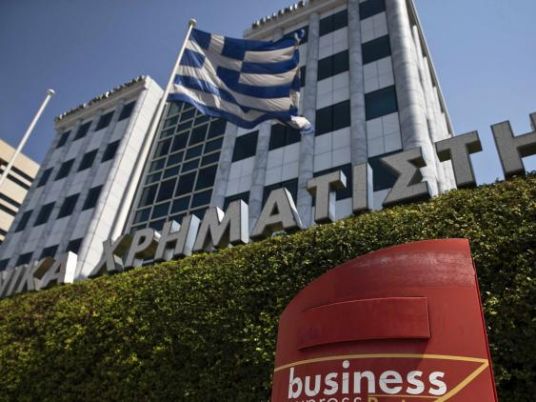
Greece's stock market suffered heavy losses on Monday, plunging nearly 23 percent at the open before recovering slightly, after a five-week shutdown brought on by fears the country was about to be dumped from the euro zone.
One fund manager described it as "herd behaviour" and said few people were buying.
The main Athens stock index .ATG was down more than 18 percent in midday trading after an initial plunge that was larger than any one-day loss experienced on the bourse. By contrast, the broad European FTSEurofirst 300 index gained slightly .FTEU3.
Banking shares, which make up about 20 percent of the Greece index, were particularly hard hit. National Bank of Greece (NBGr.AT), the country's largest commercial bank, was down 30 percent, the daily volatility limit. The overall banking index .FTATBNK was also down to its 30 percent limit.
Greece's banks have seen deposits severely depleted as Greeks have withdrawn their euros for fear the would be forcibly converted into a new drachma outside the euro zone. The banks have been propped up by emergency money from the European Central Bank.
"Bank shares look like they have more room to slide on Tuesday before bids emerge," said the fund manager, who declined to be named. "It will take a few days for the market to balance out."
Some companies outperformed, mainly those with exposure abroad, although they still fell.
Greece's biggest telecoms operator OTE (OTEr.AT), along with jeweller Folli Follie (HDFr.AT) and aluminium producer Mytilineos (MYTr.AT), which are mainly exporters, saw their initial losses ease.
"Non-financial companies will have a better performance than the banks, since their prospects are brighter and are less exposed to the domestic market," said Manos Chatzidakis, an analyst at Beta Securities.
FEARS FOR FUTURE
Trading on the Athens bourse was suspended in late June as part of capital controls imposed to stem a debilitating outflow of euros that threatened to collapse Greece's banks and hurl the indebted country out of the euro zone.
Since then, Athens has agreed a framework bailout plan with its European Union partners in exchange for stringent reforms and budget austerity.
But implementation of the deal is some way off, keeping alive the threat of political and economic instability. There is also concern that Prime Minister Alexis Tsipras may need to call a snap election.
Monday's losses stemmed from a number of reasons. Negotiations on the new bailout might bog down, for example, leaving the government and banks perilously short of cash.
A report on Sunday in the newspaper Avgi, which is close to Syriza, said the government was seeking 24 billion euros (£16.9 billion) in a first tranche of bailout aid from international lenders in August.
Of this, the newspaper said, 10 billion euros was earmarked for an initial recapitalisation of Greek banks, 7.16 billion euros to repay an emergency bridge loan and 3.2 billion euros to repay Greek bonds held by the European Central Bank and others.
The European Commission, however, believes an agreement in August is unlikely and that a new bridge loan will be needed.
Greeks themselves are being severely restricted. To limit the possibility of using shares as part of euro-flight, the government and ECB have said no extra money can be withdrawn by Greeks from deposit accounts to buy shares.
Greece's dismal economic prospects may also weigh on the market. The European Commission says the Greek economy will shrink by 2 to 4 percent this year, a return to the recession that plagued the country for six years until 2014.
On Monday, a survey showed Greek manufacturing activity plunged to a record low as new orders plummeted and the three-week bank shutdown caused serious supply problems.
Greece's economic sentiment also hit its lowest level in almost three years in July, a monthly report by the IOBE think tank showed.

